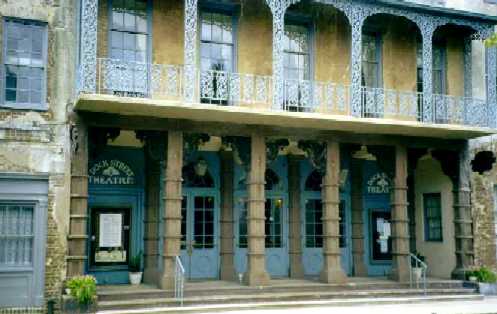
Dock Street Theater, Charleston, S.C.
Date of Construction - early 1800s
(On site of earlier 18th century Theater)

"Thursday evening last, the tragedy of Cato was played at the
Theater in this City, before a very numerous audience, the greater
part of whom were of the opinion that it was pretty well performed:
as it was the fullest assemby that has appeared in that house. It may
serve to prove that the taste of this place is not so much vitiated, or
lost to a sense of liberty, but that they can prefer a representation of
Virtue, to those of loose character."
Lengthy quotations from the play
peppered the political rhetoric of the 1760s and 1770s. The Massachusetts
Spy), a colonial newspaper, ran as its masthead theme from November
22, 1771 to April 6, 1775 the following lines of Cato (Act III, IV,
79-81):
Do thou Great Liberty inspire our Souls -
and make our Lives in thy Possession happy -
Or, our Deaths glorious in thy just defence.
The most celebrated performance
of Addison's Cato on colonial soil came in the Spring of 1778 at
Valley Forge, Pennsylvania, when George Washington ordered his tattered
troops to put on a performance of Cato, to which the citizens of
Philadelphia flocked. Forrest McDonald (Novus Ordo Seclorum, 1985,
University Press of Kansas, p.195) claims that "
........that Washington and no small number of
other founders used as a personal substitute for republican virtue. It
seems likely that the source of the ideal, in Washington's case, was
Joseph Addison's play Cato. that he saw the play a number of times,
that it was probably his favorite serious drama, and that he hah had
it staged as an inspiration to his troops are well known. That he
identified himself with one of its characters in a youthful letter, that
he repeatedly quoted from the play (without attribution) in his mature
correspondence, and that he used one of its lines in his Farewell
Address are all documenable. That it offered a role model that was
strikingly similar to the way in which Washington patterened his life
is indicated by a careful reading of the play."